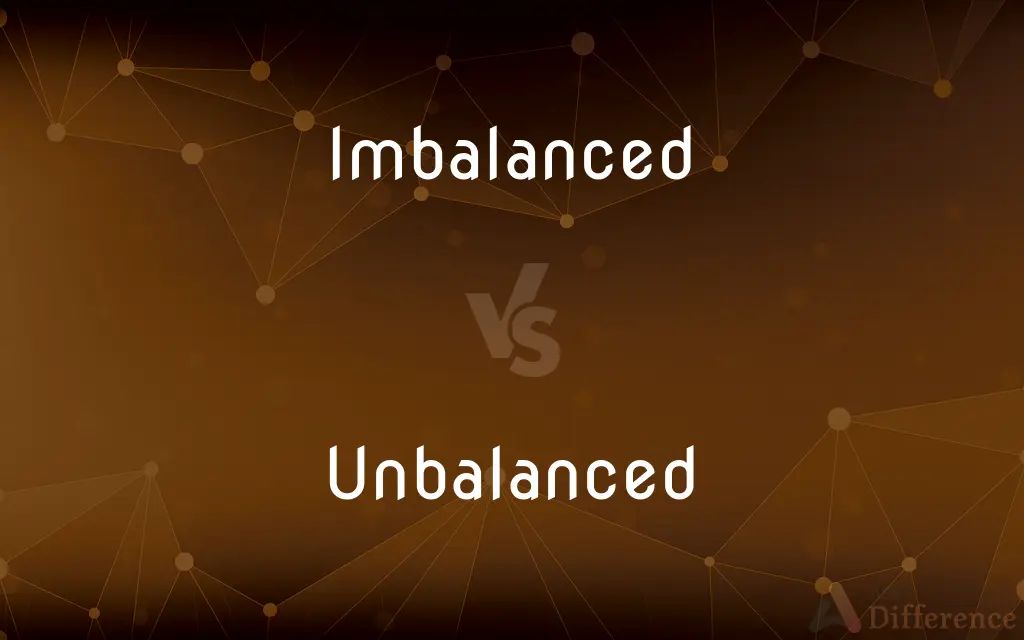Imbalanced vs. Unbalanced — What's the Difference?
By Urooj Arif & Fiza Rafique — Updated on March 5, 2024
Imbalanced highlights a lack of proportion or fairness, often used in statistical, social, or economic contexts, while unbalanced emphasizes a lack of stability or symmetry, commonly applied to mental state, physical objects, or financial accounts.

Difference Between Imbalanced and Unbalanced
Table of Contents
ADVERTISEMENT
Key Differences
Imbalanced typically describes situations or distributions that are not even or fair across all involved parties or components. It's frequently used in discussions about data sets in machine learning, where the representation across categories is not equal, or in economic contexts where wealth distribution is skewed. On the other hand, unbalanced often refers to a lack of physical stability or equilibrium, as in an unbalanced load in a washing machine, or to emotional or mental conditions that are not stable, indicating a deviation from what's considered psychologically normal or healthy.
An imbalanced data set can significantly affect the outcome of analytical models, leading to biased results and poor predictive performance. This requires specific strategies for balance restoration. Conversely, an unbalanced structure, be it a financial account with disproportionate assets and liabilities or an unbalanced diet lacking nutritional variety, points towards a need for correction to achieve stability or health.
Imbalanced is also used in social contexts, referring to power dynamics or resource distribution that disproportionately favor one group over another, leading to systemic inequalities. Unbalanced, however, can describe situations where an individual's emotional or mental state is disturbed, suggesting a need for psychological support or intervention to restore balance.
The use of imbalanced in discussions about social justice or economic disparity underscores the importance of equity and fairness, aiming to highlight and address these issues. Unbalanced, in contexts such as engineering or architecture, emphasizes the practical aspects of physical stability and the need for technical solutions to prevent failure or collapse.
Despite their differences, both terms underscore a deviation from a desired or optimal state—be it equity, stability, or health. The choice between imbalanced and unbalanced often depends on the specific context of discussion, whether it is figurative, focusing on fairness and equality, or literal, concerning physical stability or mental well-being.
ADVERTISEMENT
Comparison Chart
Primary Context
Equity, fairness, proportion
Stability, symmetry, mental state
Common Usage
Data sets, social justice, economic disparity
Physical objects, emotional state, finances
Focus
Proportional representation, fairness
Stability, equilibrium, health
Remediation
Strategies to achieve balance in distribution
Measures to restore stability or health
Examples
Imbalanced data sets, wealth distribution
Unbalanced diet, emotional state, financial accounts
Compare with Definitions
Imbalanced
Disproportionate distribution.
Imbalanced economic policies can lead to widened wealth gaps.
Unbalanced
Financially irregular.
The audit revealed an unbalanced budget with significant deficits.
Imbalanced
Skewed or biased.
An imbalanced media portrayal can influence public perception.
Unbalanced
Lacking physical stability.
The unbalanced load caused the washing machine to malfunction.
Imbalanced
Lacking fairness or equality.
The imbalanced representation in the data skewed the analysis results.
Unbalanced
Not mentally or emotionally stable.
He sought help for his unbalanced mental state.
Imbalanced
Uneven allocation of resources.
The program faced criticism for its imbalanced funding.
Unbalanced
Nutritionally deficient.
An unbalanced diet can lead to health problems.
Imbalanced
Not proportionally represented.
Imbalanced participation in the study affected its credibility.
Unbalanced
Devoid of symmetry.
The artist's unbalanced composition drew attention to the focal point.
Imbalanced
A lack of balance, as in distribution or functioning.
Unbalanced
Not in balance or in proper balance.
Imbalanced
Experiencing an imbalance; out of balance.
Unbalanced
Not evenly or properly distributed
An unbalanced allotment of resources.
Imbalanced
Being or thrown out of equilibrium
Unbalanced
Not treating all sides with due importance
Unbalanced reporting in the press.
Unbalanced
Not balanced; not in equipoise; having no counterpoise, or having insufficient counterpoise.
Let Earth unbalanced from her orbit fly.
Unbalanced
Being, or being thrown, out of equilibrium; hence, disordered or deranged in sense; unsteady; unsound; as, an unbalanced mind.
Unbalanced
Being or thrown out of equilibrium
Common Curiosities
What does unbalanced mean?
Unbalanced describes a condition lacking stability, symmetry, or mental equilibrium, often requiring intervention to restore balance.
Can a data set be unbalanced?
Typically, the term "imbalanced" is used to describe data sets with uneven representation across categories, though "unbalanced" could be colloquially used in a similar sense.
Why is it important to address imbalanced data in machine learning?
Addressing imbalanced data is crucial to prevent model bias and ensure accurate, fair predictions across all categories.
What is an example of an imbalanced situation?
An economic system where wealth is concentrated among a small percentage of the population is an example of an imbalanced situation.
What measures can be taken to address imbalanced economic policies?
Revising tax laws, increasing public spending on social programs, and implementing fair wage policies are measures to address imbalanced economic policies.
What is an example of something unbalanced?
A washing machine with clothes loaded on one side, causing it to shake during operation, is an example of something unbalanced.
Can an unbalanced object be dangerous?
Yes, unbalanced objects, especially in construction or machinery, can pose safety risks due to potential instability or failure.
What does imbalanced mean?
Imbalanced refers to a situation where elements are not evenly distributed or represented, often implying a lack of fairness or equity.
How do imbalanced and unbalanced differ in use?
Imbalanced is commonly used in contexts involving fairness and proportional representation, while unbalanced is used regarding stability, mental state, or physical symmetry.
How can one correct an unbalanced emotional state?
Correcting an unbalanced emotional state might involve therapy, medication, or lifestyle changes to restore mental health and stability.
What are the risks of an unbalanced diet?
An unbalanced diet can lead to nutritional deficiencies, health issues, and increased risk of chronic diseases.
Can an unbalanced financial account be a sign of fraud?
Yes, unbalanced financial accounts may indicate discrepancies that could suggest fraudulent activities.
How do social justice initiatives address imbalances?
Social justice initiatives aim to address imbalances by advocating for equitable policies, practices, and resource distribution.
Is imbalanced always negative?
While imbalanced often carries a negative connotation due to the implied lack of fairness or proportion, it can also signal areas for growth and improvement.
What strategies are used to balance imbalanced data sets?
Strategies include oversampling minority classes, undersampling majority classes, and employing synthetic data generation techniques.
Share Your Discovery

Previous Comparison
Peninsula vs. Delta
Next Comparison
Mistress vs. MadamAuthor Spotlight
Written by
Urooj ArifUrooj is a skilled content writer at Ask Difference, known for her exceptional ability to simplify complex topics into engaging and informative content. With a passion for research and a flair for clear, concise writing, she consistently delivers articles that resonate with our diverse audience.
Co-written by
Fiza RafiqueFiza Rafique is a skilled content writer at AskDifference.com, where she meticulously refines and enhances written pieces. Drawing from her vast editorial expertise, Fiza ensures clarity, accuracy, and precision in every article. Passionate about language, she continually seeks to elevate the quality of content for readers worldwide.














































